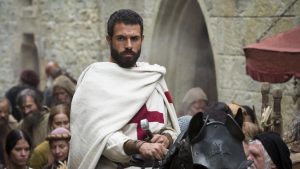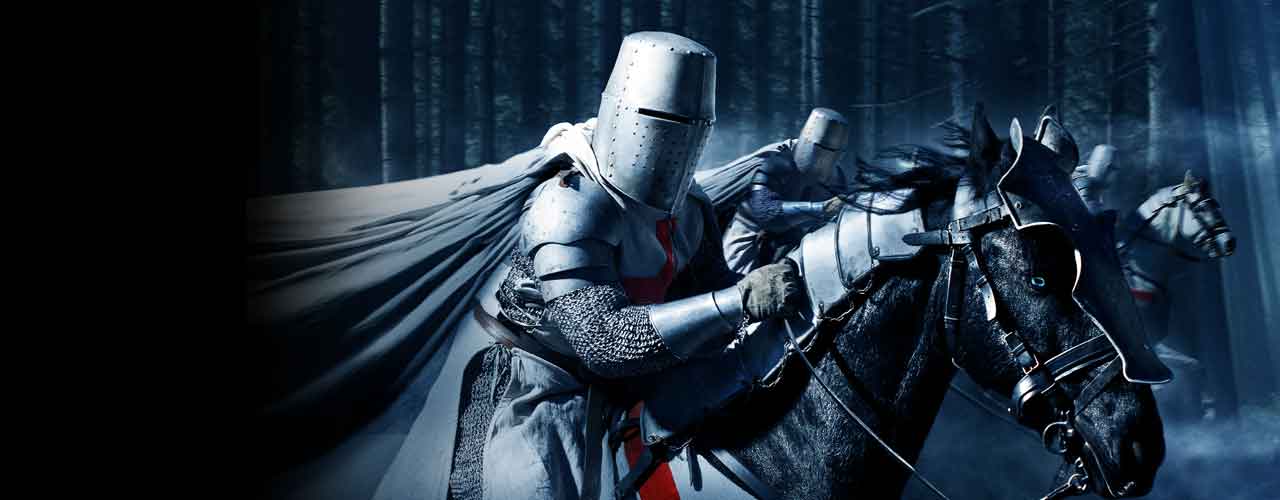About a decade ago, Dan Brown’s super popular The Da Vinci Code launched (or perhaps just made evident) a tidal wave of historical conspiracy media, and no subject received more attention than the Knights Templar. From countless books to inclusion as the villainous secret organization of Assassin’s Creed fame, the Templars’ mysterious origins and dramatic fall from grace have inspired authors the world over. At first, I was wary of this trend when I heard that the History Channel’s first new show in the style of their wildly successful Vikings would be a Templar drama known as Knightfall. To make matters worse, the show would take place in precisely the era most favored by conspiracy theorists (the final collapse of the crusader states and persecution of the order, 15 years later). While Game of Thrones or Vikings it is not, Knightfall did manage to catch my interest and entertain me through its campy drama and ringing pronouncements of medieval faith.

As with any historical drama in the post-Game of Thrones era, Knightfall is equal parts grit, action, and intrigue. The story follows the action of Landry, a French Templar stationed in Acre during the final siege of the city in 1291. Unlike many Templar mysteries, the Templars’ secret is neither esoteric or left to interpretation; they guard the Holy Grail, and it cannot be allowed to fall into the hands of the Mamluks attacking the city. Landry and his fellow knights fight valiantly to defend the city and the Grail, but are ultimately overwhelmed and must flee to their waiting ships. In the escape, the ship carrying the Grail is sunk by a Mamluk catapult shot, and the Cup of Christ is thought lost forever at the bottom of the Mediterranean. Fifteen years later, Landry and the brothers of the Paris temple sit idle in a Christendom that has no more use for Crusading holy warriors. When the Master of the Paris temple is murdered on the road, however, he leaves behind clues that the Grail may not be lost, after all. Meanwhile, King Phillip IV’s advisor, Guillaume de Nogaret, whispers in the king’s ear of the dangers of the Templars, an army encamped on French soil and loyal only to the Pope. Phillip’s close friendship with Landry keeps de Nogaret at bay, but Landry’s secret affair with Queen Joan endangers everything the Templars, and the Pope, have worked to achieve.

Like with anything on the History Channel these days (ironically), accuracy is not Knightfall’s strong suit. Though it is generally better than its sister show Vikings (more on that show in a future post), Knightfall has no issues with massaging history to fit its narrative. Pope Boniface is given a longer lease on life, and the age of Phillip and Joan’s daughter Isabella is raised up three years, while at the time of the show she should already be married to Prince Edward of England, not just beginning negotiations for her hand between England and Catalonia.
The appeal of Knightfall, for me, lies in two of its more subtle aspects. The action is fine, and the incorporation of other, minor historical themes (like the expulsion of the Jews from Paris) are gratifying, if brief. What really held my attention in the beginning was that, for all its period piece window dressing and ‘cutthroat’ politicking, Knightfall is at its heart a Grail quest, though admittedly not one as compelling as Indiana Jones and the Last Crusade. Perhaps my love for that latter film has colored my enjoyment of this show, but there is something charming about a knight on the quest for the unobtainable, finding his faith and companions tested on the road to salvation. As the show concludes, however, Knightfall transitions to something intriguing, if open-ended. In a bold move for what had simply been a medieval drama, the guardians of the Grail that Landry encounters begin to hint that the Grail is far more ancient than Christ, and that the nature of the Divine is different than any in Christendom can comprehend. What is more, these secrets somehow involve Landry himself, and at the end of the first season the viewer is left wondering where, indeed, Knightfall is headed. Is it simply a dramatic telling of the fall and persecution of the Poor Fellow Soldiers of Christ? Or is it angling for a much deeper fusion of history and mythology? Only time will tell, and I for one eagerly look forward to its next season to find out.
